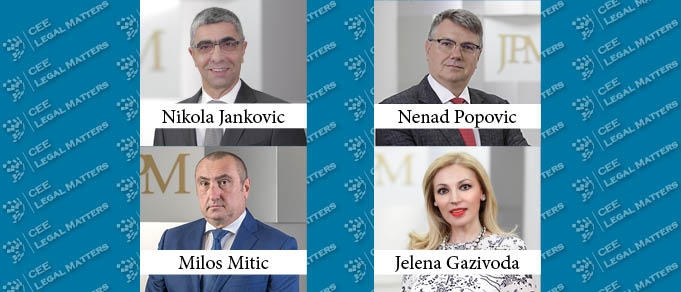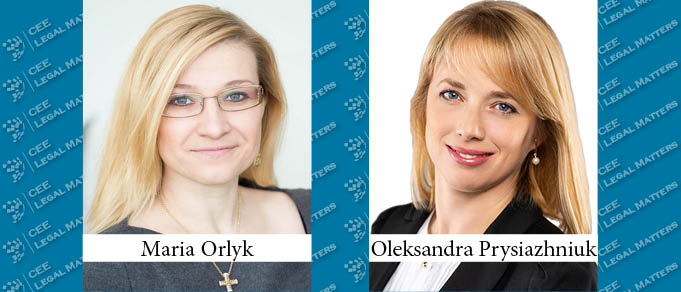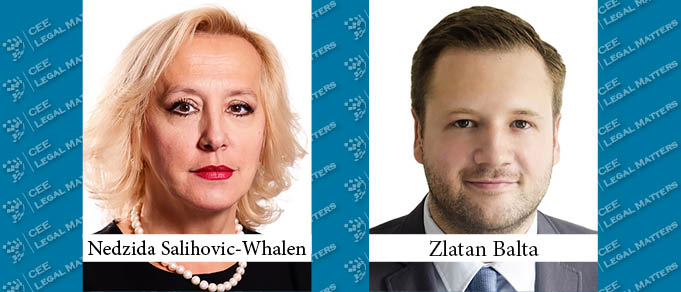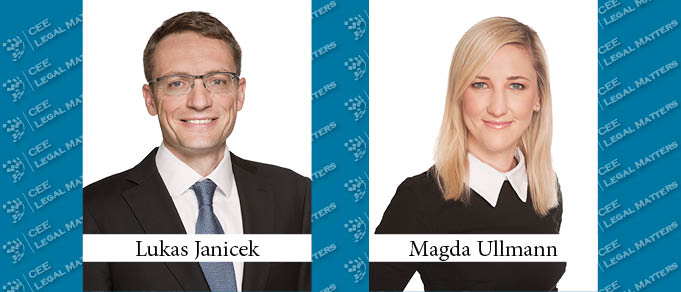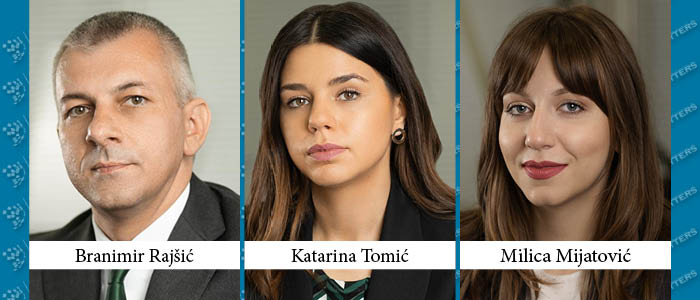As last year’s upheavals continue to influence finance markets in 2021, Erika Papp, CMS’s Head of Finance CEE/CIS, and CMS’s Regional Finance Partners Paul Stallebrass in Prague, Ana Radnev in Bucharest, and Elitsa Ivanova in Sofia offer their perspectives on what this year might hold for financing in CEE.
One Year In: Danilescu Hulub & Partners’ Road to Success
Romania lies on the historically and geographically significant crossroads between the East and the West and both its roads and its waterways provide important routes for commerce between continents. It is no wonder, then, that the transportation, logistics, and infrastructures sectors in Romania offer high potential for growth and profit. The prospect of harnessing this potential has attracted investors from around the world – and law firms positioned to help them succeed. Danilescu Hulub & Partners, founded by Partners Lucian Danilescu and Andreea Hulub in April, 2020, is one such firm.
Guest Editorial: Legal Profession and Health
Analyses of the practical and economic impacts of the ongoing COVID-19 pandemic on the legal profession are abundant, and not much new can be added. Similarly, considerations of the economy and business in general are also often covered with elaborate views of the current situation and familiar projections of often gloomy futures.
A Pearl Anniversary: JPM Celebrates 30 Years
JPM Jankovic Popovic Mitic was launched in Belgrade 30 years ago, in 1991. CEE Legal Matters used the anniversary as an excuse to reach out to Senior Partners Nikola Jankovic, Nenad Popovic, Milos Mitic, and Jelena Gazivoda for a walk down memory lane.
Mission Statement: Transforming Law Firms Into High-Performance Digital Organizations
According to its website, “Amberlo takes care of your busy-day so you can focus on what matters most,” and the company is “on a mission to help law firms transform into high-performance digital organizations.” CEE Legal Matters spoke with Amberlo Co-Founder and CEO Aidas Kavaliauskas to learn more about how the company’s cloud-based case management software built for legal professionals does just that.
An Unusual Year in Review: Our Annual Expert Round Table
On December 15, 2020 CEELM gathered legal experts from across the region for its annual Year-in-Review Round Table conversation. In a wide-ranging discussion, participants shared opinions and perspectives on their markets, on strong (and less-strong) practices across the region, and the effect of the COVID-19 crisis on both, as well as on how technology is changing the legal industry, and what the industry will look like in 2021.
Meaning of M&A in CEE
Horea Popescu, Managing Partner of CMS Bucharest and Head of CMS’s Corporate M&A Practice in CEE Looks Back at an Unusual Year.
Overview of the Corporate Governance Code of Ukraine
Good corporate governance contributes significantly to increasing company value and strengthening the confidence of investors. It has been promoted in Ukraine, as across the world, in the past few decades, and in March 2020, the Core Code of Corporate Governance, which was based on the work of over 50 Ukrainian and international experts, was adopted by the National Securities and Stock Market Commission of Ukraine (NSSMC).
Bosnia and Herzegovina: Squeeze-Out of Minority Shareholders – One Country, Two Different Regimes, Three Sets of Legislation
Squeeze-out of minority shareholders is an important concept for joint stock companies in Bosnia and Herzegovina (BiH). In the previous socialist system, many then-state-owned joint stock companies issued employee stocks as a form of partial privatization, leading to some companies having hundreds of minority shareholders with miniscule amounts of shares. This complicated the management of these companies, as majority ownership changed from state to private, since many small shareholders are unreachable, as they may be deceased or have relocated with unknown addresses. This situation often makes squeeze-outs essential for majority shareholders in order to efficiently manage these companies.
Montenegro: M&A Transactions in a Nutshell
In our legal work in Montenegro, CMS has been engaged in a number of major mergers & acquisitions, representing both buyers and sellers, including Monte Rock’s acquisition of HIT Montenegro in connection with the Hotel Maestral in Budva-Przno, the Delhaize Group’s acquisition of food retailer Delta Maxi, KKR’s acquisition of SBB/Telemach Group, and OTP Bank’s acquisition of Societe Generale Montenegro.
COVID-19 Impact on M&A Transactions in Serbia – Crisis as a Stimulus for Change
COVID-19 has changed so many things in our lives. Nothing has remained untouched, from social relations to business. Naturally, it has also heavily affected M&A activity in Serbia, just as across the entire SEE region.
Hungary: M&A Trends on CEE Markets in 2020 – Impact of COVID-19
Every spring DLA Piper publishes its annual M&A intelligence report. This past spring, we could only speculate on the effects of the pandemic as COVID-19 had just hit Europe. Informed by our experience of the past few months, we have recently published our updated M&A Global Report. Below we highlight a couple of trends that are impacting CEE.
Russia: “With Great Power Comes Great Responsibility…”
Several years ago, certain amendments concerning the status of a CEO in Russia (in Russian corporate law, as a rule, this position is called General Director) were introduced to the Russian Civil Code as a part of a major reform of Russian civil legislation. Among these changes was the introduction of the ability to limit the liability of a CEO for damages he or she inflicted on the company, although this is still not widespread and is untested in practice. In this article, we address certain key issues regarding the civil liability of CEOs in Russia, including its potential limitation.
Bulgaria’s M&A Market – The Calm Before the Storm or Simply the “New Normal?”
It has been a challenging year for the Bulgarian M&A market, with limited activity, just like in 2019. Undoubtedly, one of the reasons for the slowdown is that business is overshadowed by the coronavirus pandemic. Many acquirers abandoned expansion plans in order to focus on protecting both their financial stability and their employees, while waiting to assess the market environment and evaluate potential next steps. Many planned or already-started deals were cancelled at early stages (such as following a letter of intent or during preliminary due diligence) as uncertainty about the fulfilment of potential goals made the transactions risky.
Slovakia: The Pitfall Named 59a – Still an Issue?
One could argue that transparency and safeguard regulations in related-party transactions of companies should be well established and should not be an issue in M&As in the current environment. However, this is not the case with Section 59a of the Slovak Commercial Code, which found its way into the Code via the implementation of the Second Council Directive 77/91/EEC.
Corporate Changes That Make Romania More Attractive for Holding Companies
Back in July 2020, the Romanian Companies Law was amended to allow entrepreneurs to hold the position of sole shareholder in more than one Romanian limited liability company.
Significant Changes to Czech Corporate Law – the Impact on the Operations of Companies and Ongoing Transactions
Czech corporate law has changed significantly over these past few years. In 2014, the Act on Corporations replaced the Commercial Code that had been in place since 1991. On January 1, 2021, an additional amendment to the Act on Corporations (the “Amendment”) will go into effect.
Life Science M&A Deals on the Rise in Slovenia
Foreign investors of all types were increasingly interested in Life Science (LS) companies even before COVID-19 emerged. It is no wonder that Slovenian LS companies are of particular appeal, since this highly innovative community significantly contributed to Slovenia being ranked 21st in this year’s Bloomberg Innovation Index. Some say COVID-19 catalyzed the new deals this year, but they were more likely fostered by the new investment opportunities that keep popping up with each innovative solution offered by the relatively small (and relatively inexpensive) companies in Slovenia. The race to acquire these innovative scale-ups and start-ups has become increasingly competitive.




